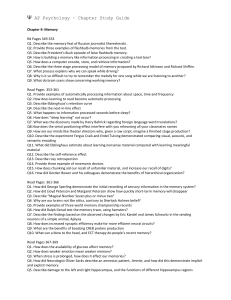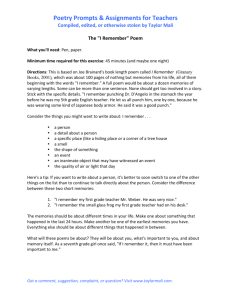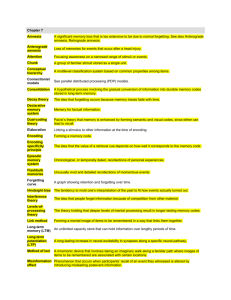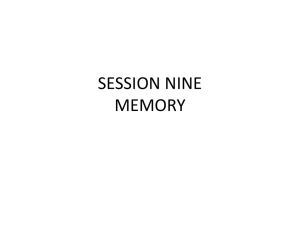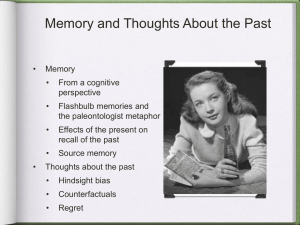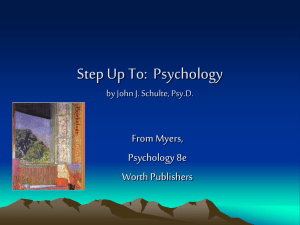Memory Modules 23 to 27
advertisement
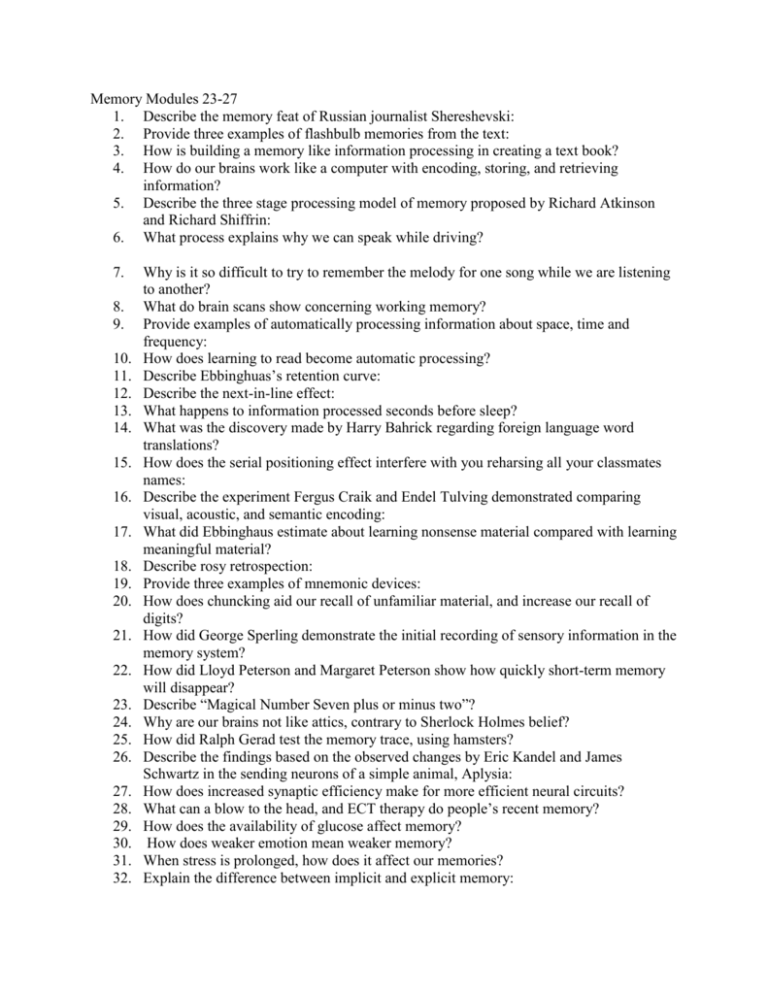
Memory Modules 23-27 1. Describe the memory feat of Russian journalist Shereshevski: 2. Provide three examples of flashbulb memories from the text: 3. How is building a memory like information processing in creating a text book? 4. How do our brains work like a computer with encoding, storing, and retrieving information? 5. Describe the three stage processing model of memory proposed by Richard Atkinson and Richard Shiffrin: 6. What process explains why we can speak while driving? 7. 8. 9. 10. 11. 12. 13. 14. 15. 16. 17. 18. 19. 20. 21. 22. 23. 24. 25. 26. 27. 28. 29. 30. 31. 32. Why is it so difficult to try to remember the melody for one song while we are listening to another? What do brain scans show concerning working memory? Provide examples of automatically processing information about space, time and frequency: How does learning to read become automatic processing? Describe Ebbinghuas’s retention curve: Describe the next-in-line effect: What happens to information processed seconds before sleep? What was the discovery made by Harry Bahrick regarding foreign language word translations? How does the serial positioning effect interfere with you reharsing all your classmates names: Describe the experiment Fergus Craik and Endel Tulving demonstrated comparing visual, acoustic, and semantic encoding: What did Ebbinghaus estimate about learning nonsense material compared with learning meaningful material? Describe rosy retrospection: Provide three examples of mnemonic devices: How does chuncking aid our recall of unfamiliar material, and increase our recall of digits? How did George Sperling demonstrate the initial recording of sensory information in the memory system? How did Lloyd Peterson and Margaret Peterson show how quickly short-term memory will disappear? Describe “Magical Number Seven plus or minus two”? Why are our brains not like attics, contrary to Sherlock Holmes belief? How did Ralph Gerad test the memory trace, using hamsters? Describe the findings based on the observed changes by Eric Kandel and James Schwartz in the sending neurons of a simple animal, Aplysia: How does increased synaptic efficiency make for more efficient neural circuits? What can a blow to the head, and ECT therapy do people’s recent memory? How does the availability of glucose affect memory? How does weaker emotion mean weaker memory? When stress is prolonged, how does it affect our memories? Explain the difference between implicit and explicit memory: 33. 34. 35. 36. 37. 38. 39. 40. 41. 42. 43. 44. 45. 46. 47. 48. 49. 50. 51. 52. 53. 54. 55. 56. 57. 58. 59. 60. 61. 62. Describe what damage to the hippocampus does to memory: What do brain scans reveal about memory in different regions of the brain? How does the cerebellum play a key role in memory? How does our dual explicit-implicit memory system help explain infantile amnesia? How did Harry Bahrick differentiate between recall and recognition concerning yearbook pictures? How do retrival cues help recall passwords? How is priming often “memoryless memory”? How does our memory system produce deja vu using contextual effects? Describe state-dependent memory: How are our memories mood-congruent? How do moods influence how we interpret other people’s behavior? How does age affect encoding efficiency? Describe Ebbinghuas’s famous forgetting curve: Describe proactive and retroactive interference: When does interference occur? How id Michael Ross and his colleagues find that people unknowingly revise their own histories? Describe the controversy over the repression: Describe the classic experiment demonstrating eyewitness accounts of memory reconstruction conducted by Elizabeth Loftus, and John Palmer: How do we discriminate between memories of real and suggested events? How do repeatedly imagining nonexistent actions and events create false memories? Describe the research conducted by Richard Wiseman regarding misinformation? How did Debra Poole and Stephen Lindsay replicate Piaget’s source amnesia? How do our assumptions alter our perceptual memories? Why do “hypnotically refreshed” memories of crimes so easily incorporate errors? Describe the incident concerning Australian psychologist Donald Thompson and how it impacted his work concerning memory distortion: What were the “memory wars” in the decade of the 1990’s? Describe the seven problems children’s witness accounts: Describe the results of implanted false memories by Elizabeth Loftus and her colleagues: Does the repression of threatening memories ever occur? Describe the eight effective study techniques in improving memory:




